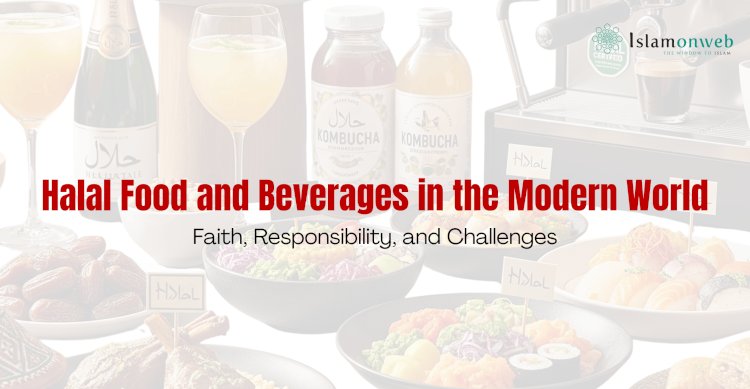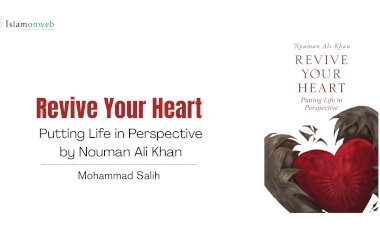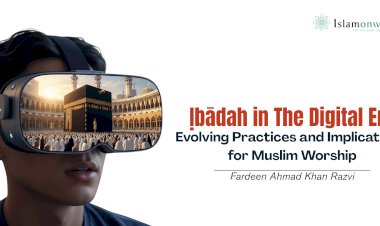Halal Food and Beverages in the Modern World: Faith, Responsibility, and Challenges
As the food industry continues to globalize, Muslims are increasingly concerned about the authenticity and transparency of halal food products. The presence of processed and imported goods, often with unclear ingredients or ambiguous labels has made it more challenging for consumers to ensure the halal status of their purchases. While Islam stress the obligation of Muslims to consume halal and tayyib food in their daily life. Malay Muslims are increasingly concerned about ensuring the food and products they consume adhere to Islamic principles, emphasizing the importance of halal and permissible choices. Therefore, this article aims to explore the concept of Halal and Haram from Fiqh perspectives. There also a need to assess Malay Muslims' awareness and perception on halal food and beverages, while identify the factors that influence their concern regarding halal status.
Concept of Halal and Haram in Al-Quran and Hadith
The term halal, derived from Arabic, means permissible or lawful in Islam. It is a fundamental aspect of Muslim life, especially regarding food and beverages. Meanwhile, haram is something that is forbidden, and between the halal and haram are doubtful things that should be avoided as much as possible.
In the al-Quran, Allah mentions halal and haram many times, and He allowed the Muslims to eat what they liked, except those that are prescribed as Haram. Among the verses that mention about halal and haram are:
يَـٰٓأَيُّهَا ٱلنَّاسُ كُلُوا۟ مِمَّا فِى ٱلْأَرْضِ حَلَـٰلًۭا طَيِّبًۭا وَلَا تَتَّبِعُوا۟ خُطُوَٰتِ ٱلشَّيْطَـٰنِ ۚ إِنَّهُۥ لَكُمْ عَدُوٌّۭ مُّبِينٌ (168)
O mankind, eat from whatever is on earth [that is] lawful and good and do not follow the footsteps of Satan. Indeed, he is to you a clear enemy.
يَـٰٓأَيُّهَا ٱلَّذِينَ ءَامَنُوا۟ كُلُوا۟ مِن طَيِّبَـٰتِ مَا رَزَقْنَـٰكُمْ وَٱشْكُرُوا۟ لِلَّهِ إِن كُنتُمْ إِيَّاهُ تَعْبُدُونَ (172) إِنَّمَا حَرَّمَ عَلَيْكُمُ ٱلْمَيْتَةَ وَٱلدَّمَ وَلَحْمَ ٱلْخِنزِيرِ وَمَآ أُهِلَّ بِهِۦ لِغَيْرِ ٱللَّهِ ۖ فَمَنِ ٱضْطُرَّ غَيْرَ بَاغٍۢ وَلَا عَادٍۢ فَلَآ إِثْمَ عَلَيْهِ ۚ إِنَّ ٱللَّهَ غَفُورٌۭ رَّحِيمٌ (173)
O you who have believed, eat from the good [i.e., lawful] things which We have provided for you and be grateful to Allāh if it is [indeed] Him that you worship. He has only forbidden to you dead animals,1 blood, the flesh of swine, and that which has been dedicated to other than Allāh. But whoever is forced [by necessity], neither desiring [it] nor transgressing [its limit], there is no sin upon him. Indeed, Allāh is Forgiving and Merciful.
The following is an example of a Hadith that describes halal and haram concepts:
I heard from Nu'man bin Bashir, may Allah be pleased with him, that he used to say: I heard from the Holy Prophet, may God bless him and grant him peace, that he, may God bless him and grant him peace, used to say, "The halal is clear and the haram is clear, and between the two, there are some doubtful matters that many people do not know (whether they are permissible or forbidden… (Sahih al-Bukhari, in the Statement of Faith, Hadith No: 52, Sahih Muslim-4094, Jami alTirmidhi-1205).
The Criteria of Halal and Haram Food
Islam has established clear guidelines concerning what is halal (permissible) and haram (prohibited), as outlined in the Qur’an and Sunnah. This indicates that the issue of halal and haram is not only a matter of Islamic legal rulings (shariah) but also one that pertains to faith and ethics among Muslims. The fundamental criteria for halal food include the following:
- It must not contain any elements derived from pigs or their by-products.
- It must not originate from carrion or animals that have not been slaughtered according to Islamic law.
- It must not be sourced from animal blood.
- It must not contain intoxicating substances such as alcohol.
- It must no be derived from any part of the human body.
According to the Malaysian Halal Certification Procedure Manual, the definition of halal for food and other products as stipulated in the Trade Descriptions (Definition of Halal) Order 2011 and its 2012 amendment includes the following conditions:
- The product must not contain any part of an animal that is prohibited for consumption by Muslims or an animal that has not been slaughtered according to Islamic law.
- It must not contain any substances considered impure (najis) according to Islamic law.
- It must not be intoxicating.
- It must not include any human body parts or substances derived therefrom that are not permissible in Islam.
- It must not be poisonous or harmful to health.
- It must not be prepared, processed, or manufactured using equipment contaminated with impure substances.
- During preparation, processing, or storage, it must not come into contact with, be mixed with, or be stored near food that does not comply with the above conditions.
Islam places great emphasis on ensuring that Muslims consume food that is both clean and halal in order to protect their physical health from disease, preserve mental clarity, and form good morals and behavior. This is because what one consumes becomes part of one’s body and ultimately affects one’s outward and inward piety.
Contemporary Fatwa in Malaysia
In these contemporary times, numerous emerging issues have given rise to uncertainty regarding the halal status of food and beverages served in shops and restaurants. Among the contentious issues are the use of labels such as “No Pork, No Lard” and the preparation of food by non-Muslims in some restaurants. These matters have led to confusion among Muslims as to whether such food is permissible to consume. Consequently, several fatwas have been issued to provide clarity and guidance to the Malay Muslim community on these concerns.
According to the Selangor Mufti Department, they stated that Muslims are not permitted, and it is haram to consume food (especially meat-based dishes) at non-Muslim restaurants or premises that merely claim “No Pork, No Lard” unless it is certain that the food is halal and does not contain any impure substances prohibited by Islamic law, such as wine, alcohol, and the like.
Besides that, fatwa was issued by the Federal Territory’s Office regarding the ruling of eating food cooked by non-Muslims said that there is no objection upon a Muslim to eat food that is cooked or prepared by a non-Muslim, from milk, vegetables, fruits, and all other types of food except their slaughtered meat. As Qatadah (may Allah have mercy on him) said: There is no harm in eating the food of the Magians (المجوس) except their slaughtered meat.
Understanding of the Halal Concept
Malay Muslims in Malaysia generally demonstrate a strong understanding of the halal concept, not only in its legal sense but also in its ethical and spiritual dimensions. Many Muslims regard halal as an essential part of daily life, extending beyond dietary rules to include cleanliness, safety, and adherence to Islamic law in every aspect of consumption. This comprehensive view reflects traditional Islamic teachings and aligns with contemporary interpretations by scholars such as Yusuf al-Qaradawi.
This deep understanding has been shaped significantly by religious education and community values. Institutions like JAKIM (Department of Islamic Development Malaysia) have played a vital role in educating the public, maintaining halal standards, and ensuring the integrity of certification processes. Despite widespread awareness, Muslims in Malaysia remain cautious and proactive, especially when dealing with foreign products or eating out. They understand that halal certification is not just about the absence of pork or lard, but includes details such as animal slaughter methods, cross-contamination risks, and ethical sourcing.
Perceptions of Malay Muslims on Halal Status in Food and Beverages
The halal status of food and beverages is a major concern among Malay Muslims. Many consumers actively check for halal logos and verify certification before purchasing or consuming products. Malaysia's halal certification from JAKIM is trusted both locally and internationally due to its rigorous and standardized processes.
However, trust does not imply blind acceptance. Consumers have expressed concerns about vague labelling such as "No Pork No Lard," especially when eating at non-Muslim establishments. They recognize that such statements do not guarantee full compliance with Islamic dietary laws. Furthermore, some individuals are cautious even with certified halal food prepared by non-Muslims, showing that religious identity and perception of the food handler still influence trust and comfort levels.
Another important aspect is the understanding of tayyib, which includes not only cleanliness and purity but also ethical practices, such as fair treatment of workers, sustainable sourcing, and safe production methods. This broader interpretation reflects an increasing desire among Muslims to integrate faith with contemporary ethical concerns.
Factors Contributing to Halal Awareness
Several key factors contribute to the strong halal awareness among Malay Muslims:
- Religious Education and Family Influence: Religious education remains the most influential source of halal knowledge. Schools, mosques, and religious classes have helped instil a deep understanding of halal principles. In addition, families play a major role in reinforcing these teachings at home. Parents serve as role models, and early exposure to halal practices at home contributes significantly to lifelong awareness.
- Social Media and Digital Tools: With the rise of digital platforms, social media has become a powerful tool for spreading halal awareness. Platforms like Facebook, Instagram, TikTok, and YouTube are widely used to share educational videos, consumer reviews, and religious advice. Mobile apps that verify halal status are also increasingly popular, allowing users to make informed choices quickly and conveniently.
- Trust in Halal Certification: The credibility of Malaysia's halal certification system, particularly JAKIM’s logo, contributes significantly to public trust. This trust is reinforced by the government's regulatory efforts and the transparency of halal procedures.
Challenges and Concerns in the Modern Context
Despite high awareness, certain challenges persist. The increasing complexity of food supply chains makes it harder to monitor and verify halal status at every stage. The risk of mislabelled or counterfeit halal products, especially from international markets, remains a pressing concern.
Moreover, while many Muslims are familiar with halal logos, fewer understand the intricate process behind certification or the religious reasoning for why certain items are deemed haram. This knowledge gap indicates a need for continued education that not only promotes halal products but also explains the religious, ethical, and legal aspects that underpin them.
Some individuals also express scepticism toward the role of technology in halal verification. While apps are convenient, concerns about accuracy, data reliability, and misuse of information limit their adoption among certain segments of the population. Addressing these issues through user education and improved digital solutions is crucial.
Recommendations for Improving Halal Awareness
To enhance halal awareness and meet the needs of a modern, tech-savvy population, several strategies can be implemented:
- Expand Religious Education: Continue integrating halal education into school curricula and mosque programs, ensuring that both children and adults understand not just the rules but also the reasons behind them.
- Leverage Media and Influencers: Collaborate with Islamic scholars, health experts, and social media influencers to spread halal awareness through engaging and trustworthy content.
- Foster Community Involvement: Organize public campaigns, workshops, and halal expos to encourage community participation and foster a deeper understanding of halal and tayyib concepts.
Conclusion
Halal is more than just a label for Malay Muslims in Malaysia, it represents a way of life rooted in faith, ethics, and personal responsibility. The growing awareness about halal reflects not only a religious commitment but also a response to modern challenges such as globalization, complex food systems, and digital misinformation. Malay Muslims exhibit a high level of halal consciousness, shaped by religious education, family values, technological tools, and institutional trust. However, there is still room for improvement, especially in deepening understanding and expanding access to reliable information. Therefore, by integrating religious teachings with modern platforms and educational initiatives, stakeholders can build a more informed, ethical, and spiritually connected society.
Authors
- Nur I’zzah Najihah Mohd Azim,
- Nur Liyana Mohd,
- Nur Saffa’ Ahmad Nazir,
- Siti Fatima Hamed
About the authors:
Nur I’zzah Najihah Mohd Azim, Nur Liyana Mohd and Nur Saffa’ Ahmad Nazir are pursuing their Bachelors’ degree in Islamic Revealed Knowledge and Heritage (Fiqh and Usul al-Fiqh) while Siti Fatima Hamed pursuing Bachelor’s degree in Al-Quran and Sunnah at AHAS, KIRKHS, in the International Islamic University Malaysia.]
[As part of Synergised Academic and Student Activities, this article was prepared for the course RKFQ 4315, Qadaya Fiqhiyyah Mu’asirah: Contemporary Juristic Issues at AHAS KIRKHS, IIUM (Sem 2, 2024-2025)]
References
Ahmad, N. (2020). The influence of social media on halal awareness among youth. Journal of Islamic Marketing, 11(3), 621–634. https://doi.org/10.1108/JIMA-03-2019-0054
Al-Qaradawi, Yusuf. (1980). al-Halal wa al-Haram fi al-Islam. Beirut: al-Maktab al-Islami.
Alqudsi, S. G. (2014). Awareness and demand for 100% halal supply chain meat products. Procedia - Social and Behavioral Sciences, 130, 167–178. https://doi.org/10.1016/j.sbspro.2014.04.020
Bonne, K., & Verbeke, W. (2008). Muslim consumer trust in halal meat status and control in Belgium. Meat Science, 79(1), 113–123. https://doi.org/10.1016/j.meatsci.2007.08.007
Hashim, R. (2021). Islamic education and moral development: Approaches in Muslim societies. International Journal of Islamic Thought, 19(1), 12–22. https://doi.org/10.24035/ijit.19.2021.186
Ismail, S., & Zain, M. (2020). Role of mass media in promoting halal certification awareness in Malaysia. Media and Communication Studies, 8(2), 99–110.
Jabatan Mufti Selangor. (2024). Taudhih al-Ahkam. Retrieved on 19 May 2025. https://emusykil.muftiselangor.gov.my/index.php/site/jawapan?id=5334
Mohamad, M., Backhouse, C., & Harrison, R. (2016). Towards a sustainable halal supply chain: Lessons from Malaysia. Journal of Islamic Marketing, 7(3), 507–520. https://doi.org/10.1108/JIMA-01-2015-0001
Musa, M. K., & Hashim, M. Z. (2022). Halal Awareness among Muslim Undergraduates at a Malaysian University. International Journal of Academic Research in Business and Social Sciences, 12(12). https://doi.org/10.6007/ijarbss/v12-i12/16059
Nor, N. M., & Syed, N. A. (2021). Consumer trust towards halal certification in Malaysia: A qualitative insight. Journal of Halal Research, 2(1), 1–10. https://doi.org/10.21834/jhr.v2i1.102
Pejabat Mufti Wilayah Persektutuan. (2017). Al-Kafi #564: Hukum Memakan Makanan Yang Dimasak Oleh Non-Muslim (Bukan Ahli Kitab). Retrieved on 19 May 2025. https://muftiwp.gov.my/ms/artikel/al-kafi-li-al-fatawi/961-al-kafi-564-hukum-memakan-makanan-yang-dimasak-oleh-non-muslim-bukan-ahli-kitab
Rahman, F. (2019). The role of family upbringing in forming halal consumption behavior. Journal of Islamic Social Sciences, 5(1), 55–66.
Ruslan, A. A. A., Kamarulzaman, N. H., & Sanny, M. (2018). Muslim consumers’ awareness and perception of Halal food fraud. International Food Research Journal, 25 (1), 87–96.
Yusof, N., Zulkifli, I., & Hassan, W. (2022). The acceptance of halal mobile applications among Malaysian consumers. Journal of Halal Industry and Services, 5(2), 32–41. https://doi.org/10.30880/jhis.2022.5.2.005
Disclaimer
The views expressed in this article are the author’s own and do not necessarily mirror Islamonweb’s editorial stance.
























Leave A Comment